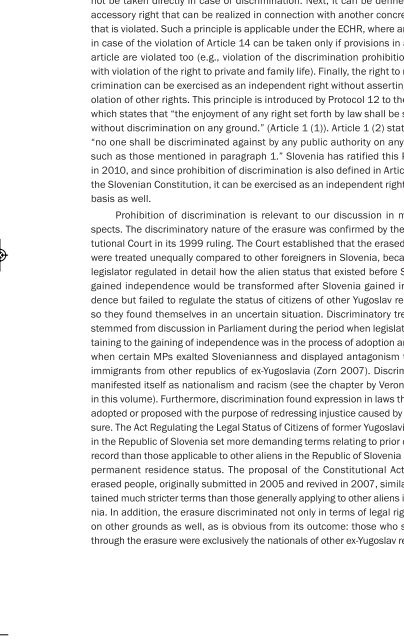The Scars of the Erasure_web
The Scars of the Erasure_web
The Scars of the Erasure_web
- No tags were found...
Create successful ePaper yourself
Turn your PDF publications into a flip-book with our unique Google optimized e-Paper software.
<strong>Erasure</strong>_4a 10.1.11 20:29 Page 136136 THE SCARS OF THE ERASUREbe secured to all without discrimination on any ground already mentioned above,to which it also adds “association with national minority” and property.Legal sources specify three ways <strong>of</strong> implementing <strong>the</strong> principle <strong>of</strong> discriminationprohibition. It can be a general legal principle, so court action cannotbe taken directly in case <strong>of</strong> discrimination. Next, it can be defined as anaccessory right that can be realized in connection with ano<strong>the</strong>r concrete rightthat is violated. Such a principle is applicable under <strong>the</strong> ECHR, where an actionin case <strong>of</strong> <strong>the</strong> violation <strong>of</strong> Article 14 can be taken only if provisions in ano<strong>the</strong>rarticle are violated too (e.g., violation <strong>of</strong> <strong>the</strong> discrimination prohibition alongwith violation <strong>of</strong> <strong>the</strong> right to private and family life). Finally, <strong>the</strong> right to non-discriminationcan be exercised as an independent right without asserting <strong>the</strong> violation<strong>of</strong> o<strong>the</strong>r rights. This principle is introduced by Protocol 12 to <strong>the</strong> ECHR,which states that “<strong>the</strong> enjoyment <strong>of</strong> any right set forth by law shall be securedwithout discrimination on any ground.” (Article 1 (1)). Article 1 (2) states that,“no one shall be discriminated against by any public authority on any groundsuch as those mentioned in paragraph 1.” Slovenia has ratified this Protocolin 2010, and since prohibition <strong>of</strong> discrimination is also defined in Article 14 <strong>of</strong><strong>the</strong> Slovenian Constitution, it can be exercised as an independent right on thisbasis as well.Prohibition <strong>of</strong> discrimination is relevant to our discussion in many respects.<strong>The</strong> discriminatory nature <strong>of</strong> <strong>the</strong> erasure was confirmed by <strong>the</strong> ConstitutionalCourt in its 1999 ruling. <strong>The</strong> Court established that <strong>the</strong> erased peoplewere treated unequally compared to o<strong>the</strong>r foreigners in Slovenia, because <strong>the</strong>legislator regulated in detail how <strong>the</strong> alien status that existed before Sloveniagained independence would be transformed after Slovenia gained indepen -dence but failed to regulate <strong>the</strong> status <strong>of</strong> citizens <strong>of</strong> o<strong>the</strong>r Yugoslav republics,so <strong>the</strong>y found <strong>the</strong>mselves in an uncertain situation. Discriminatory treatmentstemmed from discussion in Parliament during <strong>the</strong> period when legislation pertainingto <strong>the</strong> gaining <strong>of</strong> independence was in <strong>the</strong> process <strong>of</strong> adoption and later,when certain MPs exalted Slovenianness and displayed antagonism towardsimmigrants from o<strong>the</strong>r republics <strong>of</strong> ex-Yugoslavia (Zorn 2007). Discriminationmanifested itself as nationalism and racism (see <strong>the</strong> chapter by Veronika Bajtin this volume). Fur<strong>the</strong>rmore, discrimination found expression in laws that wereadopted or proposed with <strong>the</strong> purpose <strong>of</strong> redressing injustice caused by <strong>the</strong> erasure.<strong>The</strong> Act Regulating <strong>the</strong> Legal Status <strong>of</strong> Citizens <strong>of</strong> former Yugoslavia Livingin <strong>the</strong> Republic <strong>of</strong> Slovenia set more demanding terms relating to prior criminalrecord than those applicable to o<strong>the</strong>r aliens in <strong>the</strong> Republic <strong>of</strong> Slovenia seekingpermanent residence status. <strong>The</strong> proposal <strong>of</strong> <strong>the</strong> Constitutional Act on <strong>the</strong>erased people, originally submitted in 2005 and revived in 2007, similarly containedmuch stricter terms than those generally applying to o<strong>the</strong>r aliens in Slovenia.In addition, <strong>the</strong> erasure discriminated not only in terms <strong>of</strong> legal rights, buton o<strong>the</strong>r grounds as well, as is obvious from its outcome: those who sufferedthrough <strong>the</strong> erasure were exclusively <strong>the</strong> nationals <strong>of</strong> o<strong>the</strong>r ex-Yugoslav republics


